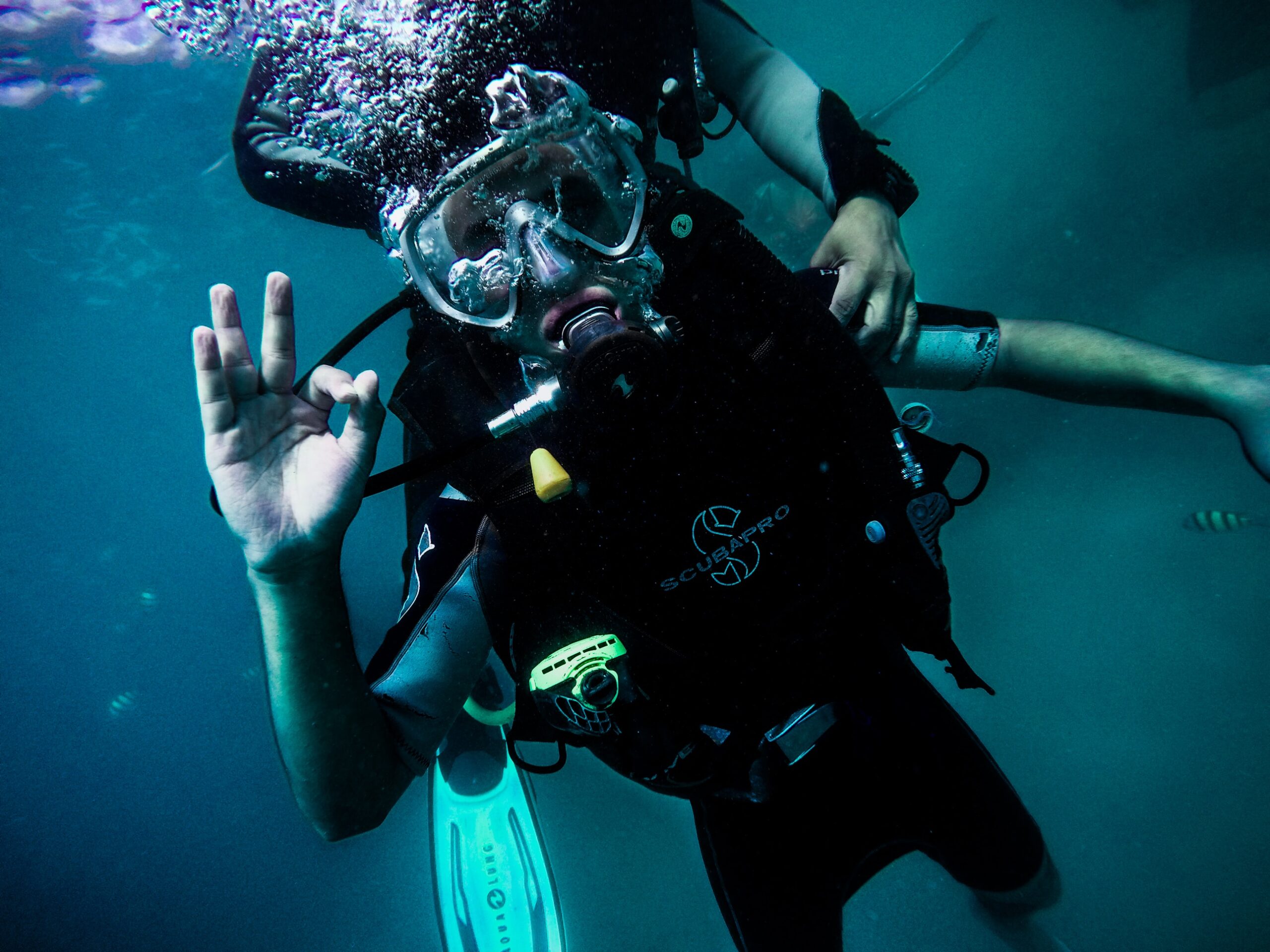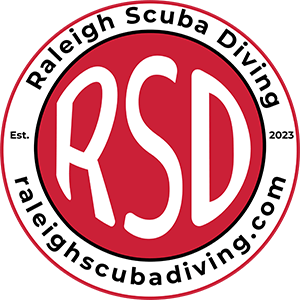 Whether you are a seasoned diver or just starting out, we’re sure you’ve heard some amazing myths about diving. We’ve heard about people exploding, being eaten by sharks & general horror stories about drowning, running out of air, etc. We asked our very own scuba diving instructors about common scuba diving myths they’ve heard and given in-depth answers below.
Whether you are a seasoned diver or just starting out, we’re sure you’ve heard some amazing myths about diving. We’ve heard about people exploding, being eaten by sharks & general horror stories about drowning, running out of air, etc. We asked our very own scuba diving instructors about common scuba diving myths they’ve heard and given in-depth answers below.
Shark attacks
Ok, let’s talk about sharks. We dive with them all the time off the NC Coast so have some experience being around them. We experience Sand Tiger sharks most of the time (which are known to be docile) but this information applies around the world.
Having a fear of sharks is the most common fear we hear from students or potential clients. Let us assure you that sharks are usually not interested in us. We are not part of their diet and, to be honest we don’t taste very good to them (the iron & copper in our blood isn’t something they ever eat). When we dive we are not diving in their hunting territories and we don’t dive where/when they usually feed. As divers, we are very loud (breathing and bubbles), we look far more formidable underwater than you think with tanks & fins (you are about about a foot taller with fins on), and we smell bad (nature calls you know). The only time ANY of our staff have ever seen a shark take interest in a diver is if they have food (spearfishing) or they are antagonizing the shark (see Darwin’s law). Sharks are truly magnificent creatures that really want to expend as little energy as possible in their daily lives. Movies & TV shows sadly give them a bad rap. The first time you ever swim with a shark, you’ll be awestruck.
I’m afraid of the ocean
That’s awesome… because if you didn’t have a little fear we’d have doubts you’ve ever seen an ocean, let alone been in one. It’s enormous, there’s no road signs and pretty much every organism there has evolved to thrive in that environment (unlike you). There are lots of steps that are taken before you hop into the deep blue. Before you go on a dive, each dive shop/instructor checks the local conditions & insures each divers experience level works for a particular locations. If it doesn’t, they should choose a new location. Most divers, especially new ones, go out with a dive instructor or dive master who briefs them on the location, the dive plan & any particulars to keep in mind. Essentially the entire process is designed to give you all the tools to have a safe & enjoyable dive. Every diver I’ve gone in to the ocean with has come back not with fear but a healthy respect of the ocean and wanting to know when they can go back.
Won’t I get the bends
Ahh.. the bends. Known to divers as DCI/DCS (Decompression Illness/Sickness) the bends are a very serious complication where usually a whole heck of a lot had to go wrong to even be a concern. DCS is most often caused by a rapid ascent from depth after you’ve been down for a while. Without going into the technical details, when you’re underwater the pressure is greater than when on the surface. As our lungs work by volume it means each breath you take you’re breathing in MORE air at depth then you would at the surface (consuming twice as much air @ 33 feet than at the surface). The result of this is additional nitrogen is absorbed into our tissues and blood. Divers are trained to make slow controlled ascents from depth so this excess Nitrogen has a chance to safely leave our tissues and be exhaled. When you ascend too quickly, the nitrogen rapidly leaves your tissues and can form bubbles in your blood or tissues. It’s not pleasant. For safety when diving deep, most divers use lines to make their controlled by both their buoyancy control device (BCD) as well as the line.
Furthermore, your dive computer (or written dive tables if you are hardcore) tell you the allowable “bottom time” you can have at a particular depth. Divers are trained to not exceed those limits which lowers the chances of getting the bends even further.
So while there is always a chance to get bent, tens of thousands of dives happen every day with no complications. I always equate it to getting into a wreck while driving. If you are a safe conscious driver you’re chances of getting into an accident are very very low but if you drive like a madman on the interstate, your chances go up.
It’s difficult
Scuba is known as the “lazy person’s sport”. The gear is heavy but once you get into the water you become weightless and the gear almost disappears. In fact, the less you move in diving the better diver you tend to be. The training is designed to be straightforward and the skills needed to dive are explained and demonstrated by your instructor right before you attempt it. Certified scuba instructors are exhaustively trained to not only show you how to perform the skill properly but how to catch mistakes and make corrections.
I need to be able to hold my breath a long time
The 1st rule in scuba diving is never hold your breath – always keep breathing! We have more than an ample supply of air with us. When you first start your dive training, you’ll learn to breathe normally when diving. Interestingly enough, when diving, breath holding does not conserve gas; it makes us breathe even faster with our body trying to purge the built up carbon dioxide. So no, we don’t hold our breaths. In fact spending an extended amount of time focusing on your breathing is very similar to yoga (and one of our favorite things about diving).
Do I have to be a great swimmer
No, you do not. Yes, you have to be able to swim and float to meet the minimum requirements to earn your certification. It does not have to be pretty but you are required to float for 10-15 minutes (or tread water) and swim continuously for 200 – 300 meters/yards without stopping. There are no time limit or required swim style. These tests aren’t about your swimming prowess but letting your instructor gauge your comfort in the water.
I’m too old
There is no upper age limit to be able to scuba dive. There is a medical questionnaire, which is part of the paperwork process. If there is a concern on that questionnaire, a doctor will need to sign off before being allowed to dive. We often see divers in their late 70’s still diving with the best of us! Don’t let age hold you back – it’s never too late to get started!
I’m not in good shape
Diving is a sport but it’s not an extreme one. Yes the gear is heavy (usually 40-50 lbs) but you generally only need to walk a short distance before you can kiss gravity goodbye for a while. While being physically fit is always an advantage, if I’m being honest, you don’t see a lot of people at the peak of their physical prowess on a dive boat. The medical questionnaire covers a lot of different areas but if you are still concerned pay a visit to your doctor to get checked out before starting scuba lessons.
I don’t live near the ocean
Ocean diving is amazing… won’t even try to say otherwise. However there are lots of options in-shore such as local quarries, rivers, and lakes. There are people who dive abandoned missile silos flooded mine shafts and pretty much any other water filled area. Please note diving in enclosed spaces or in man made structures requires a LOT of training to do safely. So while diving an abandoned missile silo sounds awesome be sure to seek out your LDS (Local Dive Shop) to find options near you and get the required prerequisite training!
Did we miss a common myth? Let us know!!




